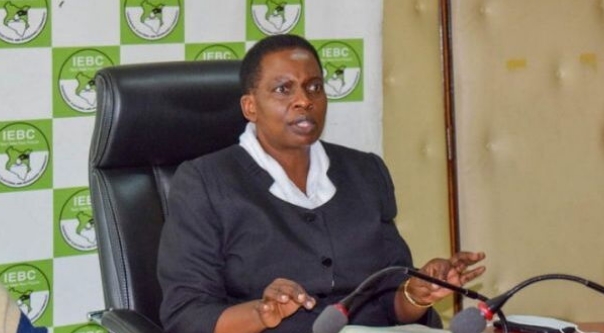KENYA : The CEO of the Independent Electoral and Boundaries Commission (IEBC) Operations Ruth Kulundu, has Proposed local printing of Ballot Papers in a bid to Cut Costs, ensure integrity of Elections.
Ms. Kulundu, speaking on Thursday, March 6, confirmed the need for local printing of the ballot papers, citing budgetary considerations and the importance of strengthening election security.
"By printing ballots locally, we can manage the risks and ensure the integrity of our elections," she noted.
The Electoral Body's Operations Chief, who was speaking at the People's Dialogue Festival, also revealed that Kenya's voter register is now 98% clean and accurate thorough audit with assistance from KPMG, a global audit firm.
Ms. Kalundu, noted that when the IEBC contracted KPMG in April 2022 to audit the register, the global audit firm conducted a thorough review and found over 4,000 deceased voters, all of whom have since been removed.
"When we engaged KPMG in April 2022 to audit the voter register, they conducted an excellent review and revealed that we had approximately 4,000 deceased voters in the register," said Kulundu.
"We ensured the register was cleaned up 60 days before the general election. Moreover, we corrected discrepancies in voter transfers, ensuring that individuals were placed in their proper voting areas."
Despite these improvements, Kulundu highlighted a critical challenge for the commission. She revealed that IEBC is currently unable to proceed with continuous voter registration due to the absence of plenary commissioners.
Kulundu called for the immediate appointment of new commissioners to allow the commission to resume its work.
"We are unable to move forward with continuous voter registration until we have plenary commissioners in place. The process to appoint new commissioners must be finalised by May or June this year to ensure we can continue this important work," she said.
The report by KPMG also unearthed weak password systems and log-in details of ghost electoral officials, pointing to the possibility of hackers accessing the database and proceeding to deny voters their right to cast their ballots by either deleting their details from the roll or transferring them away from their preferred polling stations.
"KPMG analysed the full register and noted that there were transfer transactions processed between the 2017 General Election and May 2022. The analysis of those transfers identified several constituencies and counties showing trends of abnormal voter transfers having been processed in the Register of Voters," said IEBC in a statement dated June 20, 2022.
Meanwhile, the electoral body recently revealed it needs Sh61.7 billion for the 2027 General Election, drawing mixed reactions from the Citizenry, with some questioning the high costs.
The Budget estimate, was on Tuesday, February 25, presented before the National Assembly Justice and Legal Affairs Committee by the commission’s Deputy CEO, Obadiah Keitany.
The Amount, is a Whooping Sh17.1 Billion More than the 2022 polls, when the National Treasury allocated Sh44.6 billion to the electoral body.
If allocated, the funds will cater for new voter registration, replacement of KIEMS kits, conduct pending by-elections, civic education, acquiring new voting material etc.
Justifying the Budgetary rise need, Keitany stated that the Commission projects an additional 5.7 million new voters to have a total of 28 million voters in Kenya's 2027 General Elections.
“The Commission projects additional 5.7 million new voters to have a total of 28 million in the 2027 General Election. We have the budget for boundary delimitation of Sh7 billion but we are still waiting for the court advisory,” he explained.
IEBC Director of Finance Osman Ibrahim added that to facilitate upcoming 14 by-elections that are already due, the commission will require an additional Sh480 million.
According to the Electoral Body's Finance Director, a significant portion of the budget will go toward replacing outdated election equipment.
According to him, the Equipment Includes Kenya Integrated Election Management System (KIEMS) kits, the electronic devices with a biometric voter registration system used to verify a voter’s identification to curb impersonation and enable presiding officers to transmit results to observation centres through specially configured mobile devices.
“There will be total replacement of 45, 352 KIEMS kit except for the 14,000 bought in 2022. Total required kits are 59,352. KIEMS kits [automatically] become obsolete after 10 years,” Ibrahim told the MPs.
Historically, Kenya has been ranked among developing countries with some of the most expensive elections.
At an average cost of about KSh. 2,000 per voter, the August 9, 2022 general election was one of the most expensive elections in Africa and the second most expensive in Kenya.
With 22,120,458 registered voters, and over 16,000 candidates vying for elective seats, Kenya’s average cost for the polls surpassed the Average Cost per Registered Voter Index (ACRVI) benchmark of five dollars (Ksh596) per voter, by a considerable margin.







